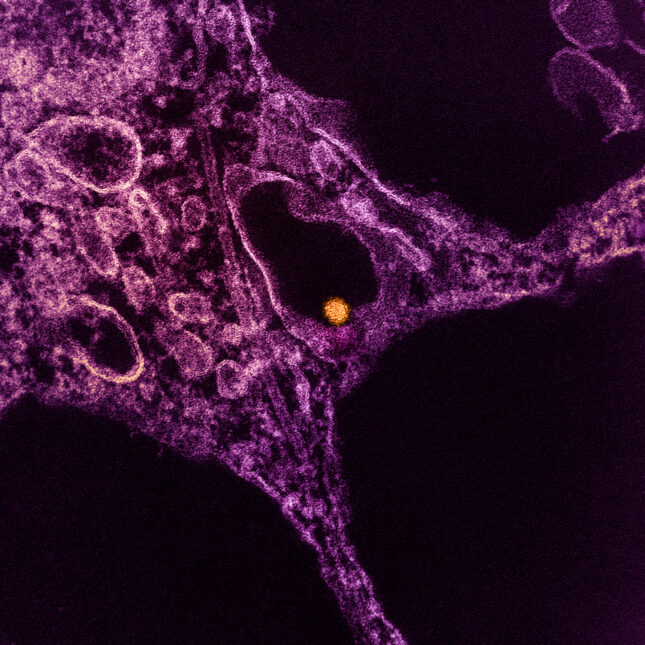
What was that mosquito thinking as the six needles of its proboscis mouth bit into my mother’s skin? Had it taken a long, unplanned journey in a bag as a tourist traveled north from a tropical Caribbean island? Or was it an old-time New York mosquito that had feasted the night before on the sweaty skin of a feverish traveler from the south?
My mother would remain incredulous at her bad luck: Why did this mosquito choose her arm to snack upon? She is nearly 90 years old woman and has lived a quiet life that involves walking her curly-haired Jack Russell, Millie, to and from Central Park.
No matter the reason, in August my mother became the unlucky first patient of the year to suffer from West Nile virus encephalitis in Manhattan. Soon after her diagnosis, Central Park would be sprayed overnight in hopes of slowing the spread of yet another new global viral infection.
The West Nile virus is part of the flavivirus family that includes Zika and dengue. For many years, the North American epicenters of West Nile infections were in the more temperate regions such as the Caribbean, where the warmth, seasonal rain, and flooding makes a perfect home for infected mosquitos. New York’s climate, however, is increasingly hospitable to these mosquitoes.
The vast majority of humans infected by West Nile virus either have no symptoms at all or minor flulike symptoms. Less than 1% of people develop severe illness from West Nile virus.
This number increases to less than 2% for those above the age of 60, as my mother and I learned.
For a week, she had felt a little tired and “off” but assumed it was simply a case of “being 89.” On the day she became acutely ill, she had spent the morning with my sister’s son, Daniel, in their two-person book group discussing Tolstoy’s “War and Peace.” (Daniel was about to start college to study computer science and artificial intelligence, and she wants him to have a firm rooting in the humanities.)
When she attempted to stand after a few hours of sitting, her legs would not hold her. She instructed Daniel to call 911 and then his mother.
As a pediatric surgeon, I know only enough geriatric medicine to be dangerous, but I do know to look for common causes before the more exotic. Mom appeared as if she might have suffered a stroke, and after some initial testing, it made sense to treat her as if she had.
But the next day, she wasn’t only not improving; she also began to slur her speech and her blood pressure fell. Worried she had some underlying infection, her health care team extended their search for an underlying cause while treating her broadly for possible forms of infection. Thankfully she was not aware enough to feel the spinal tap performed.
It took more than a week before the infectious disease team notified us that they had identified the virus in her spinal fluid: West Nile. They seemed as surprised as we were.
Often, with the diagnosis comes a treatment and a cure. Not with this virus. The more I read, the less confident I felt we could make any predictions at all about Mom’s recovery. There is simply so little data (other than the anecdotal report of Anthony Fauci’s similar suffering a week or so later). Would our strong, proud, autonomous mother be able to speak clearly again, walk again, take care of herself again? The only treatments were time and, we hoped, our large family’s 24/7 presence, which her nurse described as “love is medicine.”
After three weeks that seemed a year, Mom began to wake up, unaware of the time that had passed. As her mind slowly cleared, she began muttering over and over: “What happened?” When told, she was simply incredulous about being the first case in Manhattan this year and about being the reason Central Park was now being sprayed. Why her? I knew her powers of reasoning were returning when she told me: “Nobody wants to be this kind of first.” She spent the next week in the hospital before moving to a rehabilitation center to continue her recovery.
During her first week in the rehab center, we spent hour after hour talking as she tried to make sense of what happened, why, and what to do in this new world where she could not see or hear or walk as she had been able to just a short time ago.
“I feel like someone else,” she told me. “I don’t feel like me.”
My mother was a patient, as we all have been or will be at some point or another. She wondered why she had become ill; I certainly understood this desire.
But feeling like someone else — that’s different entirely. We may be surrounded by those we love and love us, but our beginnings, our endings, and our pain are ours and ours alone. Even more haunting than being separated from others is the feeling of being separated from yourself. My mother’s very thoughts — what made her “her” — now felt like someone else’s.
On my return to Boston and my work, I stopped to speak with an infectious disease colleague with whom I share patients. When I told her of my mother’s illness and her slow recovery, she told me, unprompted: “The thing that is hardest after West Nile virus is that patients just don’t feel like themselves. The feeling seems to go away over time, but it does take a while.”
She told me this as if this were a simple, well-known medical dictum. As I left her to continue down the hall to see my patient, I wondered if this feeling of “other” was indeed specific to West Nile virus and why. If we suffer from other forms of inflammation of our brain (encephalitis), would we feel the same way? Is the feeling of self-isolation more pronounced with West Nile virus encephalitis but true of all of us when sick?
As I walked into the room of 12-year-old girl hospitalized for pneumonia, I wondered: How often is the journey back to health also the journey back to self?
More than a month after her diagnosis, my mother is still somewhere on that journey — and it’s my great hope that she will make it to her destination.
Christopher Hartnick is a professor of otolaryngology at the Harvard Medical School and at Massachusetts Eye and Ear.





